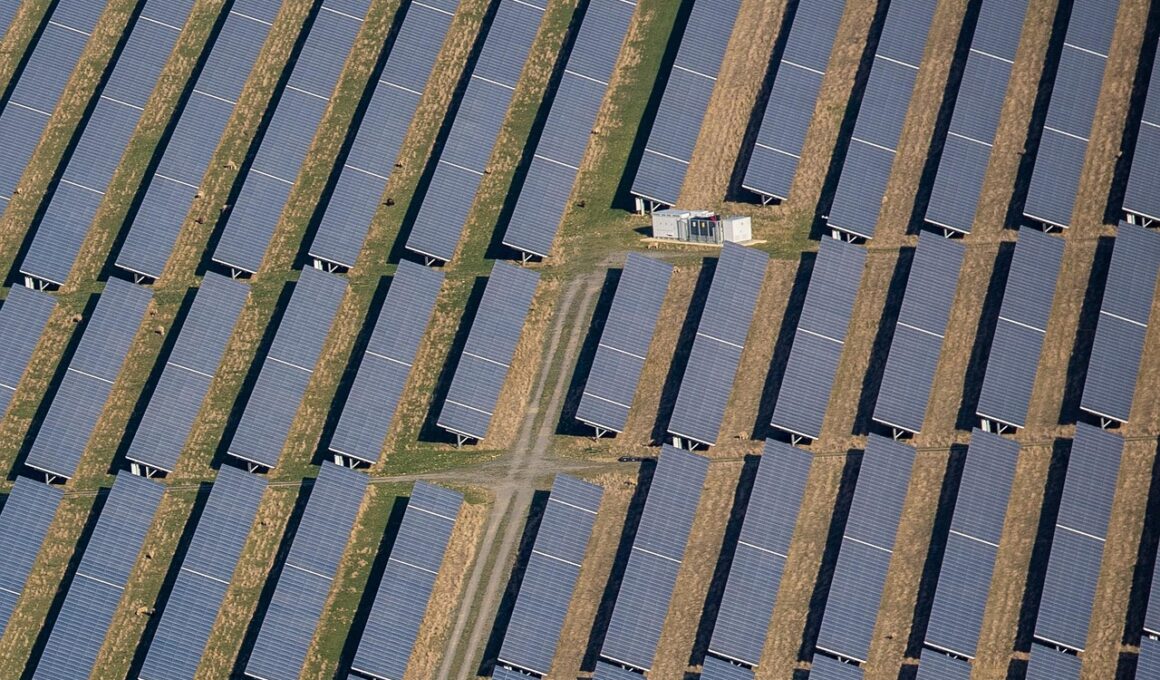The Growth of Sustainable ETFs Focused on Renewable Energy
The financial landscape is transitioning toward sustainability, with Exchange-Traded Funds (ETFs) focused on renewable energy showing remarkable growth. These ETFs provide investors with a diversified portfolio of companies involved in clean energy production, enhancing their exposure to emerging technologies. With climate change concerns becoming paramount, both retail and institutional investors seek opportunities in renewable energy sectors, such as solar, wind, and hydroelectric energy. This investment approach aligns financial returns with the pursuit of environmental goals. Sustainable ETFs are particularly attractive due to their transparent structure and liquid trading, allowing investors to capitalize on price movements while contributing to a sustainable future. They offer a modern way of investing that emphasizes ethical considerations and sustainability, drawing attention from various stakeholders. The rise of these funds signifies a shift from traditional investment strategies, where profits often take precedence over environmental impact. Investors are increasingly looking for ways to integrate sustainability into their portfolios without sacrificing returns. This trend is reflected in the growing number of renewable energy-focused ETFs available in the market today, carving a niche for sustainability-centered investing strategies.
Investing in renewable energy has become a robust strategy due to the increasing demand for clean technologies. Factors such as technological advancements, decreasing costs of renewable energy production, and supportive government policies play essential roles. Growth forecasts suggest that investments in renewable sectors are set to expand rapidly over the next decade. Analysts predict that renewable energy sources could constitute a significant portion of global energy consumption as societal awareness around climate issues rises. Many major economies are setting ambitious targets for carbon neutrality, further incentivizing investments in these areas. This demand encourages the creation of innovative financial products such as green bonds, which complement renewable energy ETFs. Spotify, Tesla, and NextEra Energy have made substantial contributions to this movement, successfully showcasing renewable energy’s profitability potential. These companies exemplify how aligning business objectives with sustainability can yield impressive financial results. The positive outcomes are also attracting traditional investors, creating a more robust funding environment that supports renewable energy initiatives. As demand increases, the supply of available ETFs catering to these investments will likely grow, further diversifying options for investors interested in the renewable energy sector.
Benefits of Investing in Renewable Energy ETFs
Investing in renewable energy ETFs offers multiple advantages for investors looking to blend ethical considerations with financial growth. First, they provide broad market exposure to the renewable energy sector, allowing participants to mitigate risks commonly associated with concentrated investments. By holding a basket of stocks, investors can avoid over-reliance on a single company’s performance. Secondly, these ETFs typically have lower fees compared to actively managed funds, making them accessible for average investors. This cost-effectiveness aligns with the trend of democratizing investment opportunities, helping everyone participate in the growth of sustainable finances. Furthermore, many renewable energy ETFs are designed to track indices that focus exclusively on sustainable energy firms, ensuring that investment dollars are directed where they can make the most significant impact. The growth of electric vehicle technologies and advancements in battery storage further enhances the appeal of these ETFs. As the entire ecosystem of renewable energy evolves, savvy investors can enjoy impressive returns while simultaneously supporting meaningful environmental advances. This dual benefit makes renewable energy ETFs a compelling addition to investment portfolios for both novice and experienced investors alike.
However, while the growth of renewable energy ETFs is promising, potential investors should remain aware of certain risks associated with these funds. The renewable energy market is influenced by various factors, including fluctuating policy landscapes and technological advancements. Changes in government support or regulatory frameworks may introduce volatility that could affect returns on investments significantly. Furthermore, market competition may also lead to reduced margins for companies operating in this space, impacting their profitability. Investors must conduct thorough research before allocating funds, considering both macroeconomic factors and specific company performances. Although the renewable energy sector has shown resilience over time, investing in ETFs still requires a diligent approach. Another consideration is the limited historical data surrounding these newer funds, making it challenging to predict long-term performance trends accurately. Volatility in energy prices and unexpected shifts in consumer demand could also introduce unforeseen challenges for investors. Therefore, a well-diversified investment approach, proper risk assessment, and awareness of sector-specific challenges remain critical for anyone considering an investment in renewable energy ETFs.
Performance of Renewable Energy ETFs
In recent years, the performance of renewable energy ETFs has captured market attention, showcasing strong returns. These funds have benefited significantly from the global shift toward renewable sources and the increasing adoption of green technologies. For instance, several notable ETFs have consistently outperformed broader market indices, demonstrating the lucrative potential of this investment class. Periodic financial reports reveal impressive annual growth figures for many funds, prompting a surge in investor interest. Notable examples include the Invesco Solar ETF and the iShares Global Clean Energy ETF, which have consistently delivered positive returns since their launch. This historic performance stands as a testament to the sector’s resilience in the face of challenges, attracting both new and seasoned investors. Furthermore, renewable energy ETFs frequently invest in companies with innovative technologies and solutions, positioning them well in the market. Enhanced focus on sustainable practices and global environmental initiatives often serves as a catalyst for continued growth. Such financial outcomes reinforce the narrative of earning while contributing to a sustainable future, creating a strong incentive for responsible investing practices among financial analysts and consultants urging sustainability commitments.
As the dynamics within the renewable energy sector continue to evolve, innovative strategies emerge to encourage new investments. One developing trend involves the creation of thematic ETFs that focus on specific aspects of renewable technologies, such as solar power or wind farm developments. These thematic strategies allow investors to zero in on particular industries within the broader energy market without needing extensive research. By targeting sectors poised for significant growth, investors can potentially increase their returns while taking advantage of future market trends. Thematic ETFs also enable more impact-driven investing, aligning investor interests with ecological objectives. Investors who value sustainability are actively looking for ways to support environmentally conscious practices through their financial choices. Furthermore, as corporate sustainability initiatives gain traction, many companies are now promising greener operational practices, thereby attracting more attention. Marketing efforts surrounding these ETFs often emphasize their commitment to combating climate change while ensuring profitability. Consequently, as innovative strategies continue to develop, we may see a burgeoning interest in tailored investment options within the renewable energy fund landscape, reflecting consumer demands and evolving market preferences.
Conclusion: The Future of Renewable Energy ETFs
The future of renewable energy ETFs looks promising as more investors recognize the significant benefits of sustainable investing. The combination of environmental consciousness and potential financial perks is increasingly alluring, encouraging a widespread shift toward these funds. Financial institutions are acknowledging this trend, onboarding more renewable energy assets within portfolios. Policymakers and regulators are also ramping up support for green technologies, ensuring a conducive environment for growth. This supportive backdrop lays the groundwork for sustained expansion of renewable energy ETFs, establishing them as essential components of modern investment strategies. The increasing integration of artificial intelligence and data analytics tools also facilitates better decision-making processes for investors interested in these sectors. As technological advancements continue to emerge, the renewable energy and related sectors will likely stabilize, fostering confidence among investors. Additionally, the ongoing dialogue surrounding climate objectives reinforces the relevance of these investment vehicles. It is clear that the intersection of sustainability and finance is here to stay, positioning renewable energy ETFs as not only viable but also essential for a comprehensive investment strategy targeting future market demands.
As awareness about climate change and sustainability grows, the significance of renewable energy is increasingly recognized. Educational initiatives aimed at informing investors about the potential of renewable energy technologies will further promote interest in these areas. Many institutions are now offering courses and workshops focused on sustainable finance, reflecting a growing commitment to these fundamental principles. As investors become more educated about the implications of climate change, their investment decisions will increasingly align with long-term sustainability goals. Moreover, as the transition to an energy-efficient future gathers momentum, we can expect growing investment opportunities across various sectors. Collaborative efforts among governments, businesses, and non-profit organizations will play a pivotal role in shaping this landscape. Their joint initiatives will promote clean energy projects, thereby creating pathways for new investments. Socially responsible investors are also measuring a company’s impact on the environment, holding them accountable while seeking returns. This changing investor sentiment can lead to a more significant influx of capital into the renewable energy sector, helping to scale innovative solutions. In conclusion, the future of renewable energy financing through ETFs appears bright as the market evolves, driven by increasing demand and enhanced investor engagement.


